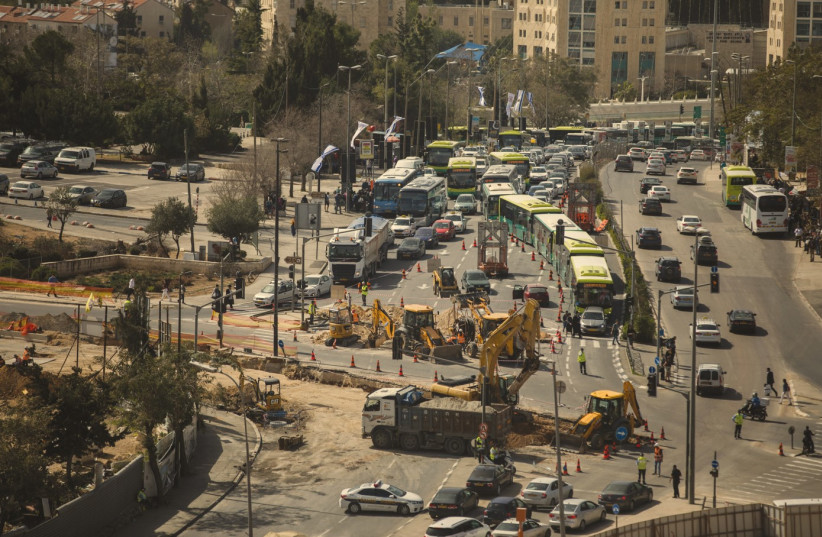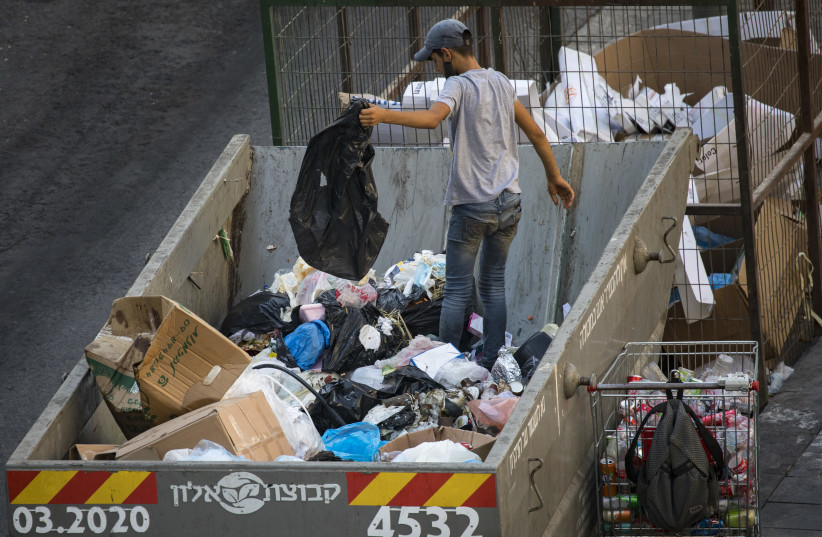A few hours before the anticipated tense funeral procession of Al Jazeera journalist Shireen Abu Akleh, Jerusalem Mayor Moshe Lion took time to answer questions ahead of the 55th anniversary of the unification of the city he heads.
Lion is the first mayor to serve without his own faction on the council. Although he has managed to include representatives with a wide range of viewpoints into his coalition – including Laura Wharton, Yossi Havilio and Fleur Hassan-Nahum – no less than 17 seats are held by representatives from the city’s ultra-Orthodox sector.
Some argue that he is a captive in the haredi representatives’ hands; some point to his achievements nonetheless. The status quo is respectable despite attempts to gnaw at it, and Lion insists that only in a pleasant way can the city be run. In any case, he has no intention of confronting either side.
The government’s decision to allocate huge budgets to improve the situation in the east of the city occurred at the beginning of his term, and Lion believes that thanks to the cleanliness, the improved infrastructure and the schools he is building in the east of the city, he will also buy peace and security.
<br>This is your fourth Jerusalem Day in office. How do you feel, beyond all the slogans and speeches?
Every day is a day of joy and excitement. Being the mayor of Jerusalem is a very responsible and important role. Jerusalem is in fact a small country. Jerusalem has already gone through the recovery process that I pledged to carry out since my first Jerusalem day in office, and today I can look back with great satisfaction, seeing that a large part is coming true.

But residents mostly see traffic jams, construction and dust.
It is true that these processes take time, but these are processes that can no longer be stopped. In the short term, it was important to change the image of a dirty city. Before I was elected mayor, I promised myself – not the voters, but to myself – that when elected that would be the first thing I will deal with. Today I can say that Jerusalem is one of the cleanest cities in the country, if not the cleanest both in the west and in the east of the city.
<br>You also invest large budgets in renovating sidewalks...
That’s the second thing I took upon myself – to renovate the streets of Jerusalem, so that all can see what an amazingly beautiful city it is. Take for example King David Street; now it shows the honor due to King David Street. I am making sure that the same is being done in every neighborhood.
<br>Lovely streets and sidewalks are important, but is it enough to keep the young generation here?
I want this city to be a magnet for all young people, both those who live in Jerusalem and those who will come from outside. Precisely because I was not born in Jerusalem, I can compare and there is nothing like Jerusalem to live in – a fascinating city, an amazingly active city, a city with a huge culture, great education.
<br>We agree on this, but still – how are you promoting this vision?
In order to achieve it, I had to work on three levels: housing construction, employment and mass transportation. In the last 15 years, we had built an average of between 2,000 and 2,300 apartments per year. That’s all. But in 2021, we managed to build 5,400 housing units. The year 2022 will end with 6,000 units, the same for 2023. This is a dramatic change.
<br>But they remain totally unaffordable. Who can buy an apartment in Jerusalem? Certainly not local young couples.
True, they are still very expensive but if I didn’t push for these construction [projects], they would be even more expensive. Yet in order to lower prices, one must increase supply.
<br>Why not encourage reasonably priced and long-term rentals? And what about your personal involvement in moving the government toward lower plot prices? Why don’t you put pressure?
First of all, we are building apartments for long-term rent. As for the land, the only way to build in Jerusalem is through urban renewal, because we also want to preserve the green areas. I launched renewal construction projects in the Katamonim, Kiryat Yovel and Kiryat Menachem neighborhoods.
I have no doubt that when we have a large supply of apartments, prices will go down. Wherever possible, we approve long-term rental apartment projects, which have already been approved in Pat, Pisgat Ze’ev, and on Jaffa Street. My goal is to get thousands of housing units for rent, at reasonable prices.

How about employment? Jerusalem is still a very poor city.
We are currently in the process of building 500 million sq.m. of hi-tech office buildings throughout the city, for hi-tech companies that are moving to Jerusalem. It’s beyond planning; it’s already happening.
<br>Hi-tech people get higher salaries than usual so far in Jerusalem. Does that mean that Jerusalem will no longer be the poorest city?
Yes. There are three layers of salaries in Jerusalem – tourism and related services employ about 20% of the workers in the city, with relatively low salaries; the government ministries, which are a little higher; and now we will have more of the hi-tech industry. Within three years there will be great hi-tech employment here.
<br>Traffic in the city. People spend hours in jams. The municipality says “use public transportation” but at the same time, every week a new parking lot opens. So what do you really want?
You cannot educate the public and tell them to travel now, in 2022, by public transportation if you do not have a sufficient supply of mass transportation. I am building the light rail line that will reach Hadassah-University Medical Center and Neve Ya’acov. The Green Line, within two years, will start traveling around the city, from Gilo to Mount Scopus.
But right now we do not have enough public transportation. I cannot tell the residents to use public transport if a bus that passes by their station is full and does not stop. I have to provide solutions for today. Once there is full public transportation, these parking lots will close down; I will not have to do it.
<br>Let’s talk about the east side. Today, with the 3970 five-year plan, infrastructure and cleanliness are improving. However, the atmosphere is charged and there is tension, around Damascus Gate, on the Temple Mount. The police use a lot of force, and some politicians are stirring. Why is your voice not heard? Your job is not just to clean the city and build apartments. After all, you are a man of peace and dialogue, not a man of quarrel and strife.
I believe in doing and not in talking.
<br>Politicians attempt to stir up the atmosphere. Do you talk to them?
Jerusalem is the city of Jews, Arabs, the secular and the ultra-Orthodox and the religious. We need to maintain a status quo and if it is about the parade of flags – that is not what makes the problem in the city; it is Jerusalem Day; we do it every year.
<br>Did you try to interfere?
I do not interfere in these matters.
<br>Why not? You’re the mayor, and everyone knows your attitude is of dialogue, of softening tensions. Why don’t you get involved and talk?
I am the mayor, but I will not interfere publicly. What I can do in chambers, I do. But I am less likely to criticize the action of a member of Knesset or the actions of ministers. I know what needs to be done in the city, and accordingly I run the city, and I think I run it nicely.
You will not hear me utter a word of criticism, not about MK Itamar Ben-Gvir nor about MK Ahmad Tibi. It’s not the mayor’s job. And even if it is, I’m doing it my way. Not in public.
<br>Sometimes people have to pound on the table...
Believe me, if I have to pound on the table, I do it.
<br>But we are not aware of it.
No need to hear about it.
<br>Maybe you’re not a politician.
I said from the beginning, I’m not a politician. When necessary, I express my opinion. But in the end, I have to convince the decision-makers, so I talk less and do more.
<br>Corona is almost over, but tourists are still afraid to come because of terror.
I walk around the streets of Jerusalem every Saturday, including in the Old City, and we are beginning to see tourists. Jerusalem is a very safe city. There are fewer tourists still because of corona. Jerusalemites are not involved in terrorism. Everyone realizes that we need to live together; we all have something to lose.
<br>Are you concerned about the rise of Hamas among Arabs in the city?
I am not worried, but I am aware of it. There is no place in Jerusalem for Hamas. I really intend to do and act with all the means at my disposal, and I mean all the means – including direct contact with the government and the authorities, so that Hamas will not get a foothold here.
<br>Thank you, Mayor Lion.
Happy Jerusalem Day.
